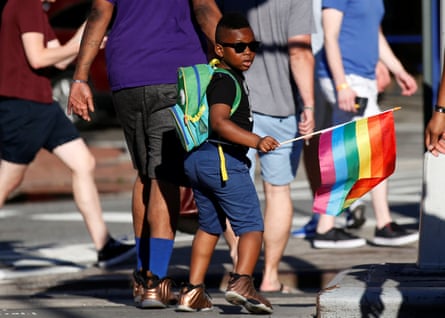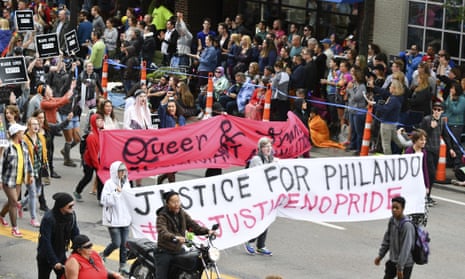Anti-police protesters disrupted the Twin Cities Pride parade on Sunday, over the police shooting of Philando Castile.
Sunday’s parade was interrupted just minutes after getting under way in downtown Minneapolis. Radio station WCCO-AM reported that about 200 protesters began marching down Hennepin Avenue and at one point staged a “die-in”.
On Friday, parade organizers invited police to participate in the annual parade after initially asking them to minimize their involvement due to tensions over a jury’s acquittal this month of a Minnesota officer who fatally shot Castile during a traffic stop last year.
Janee Harteau, the first openly gay Minneapolis chief of police, called that decision “divisive”.
On Sunday, protesters chanted “no justice, no peace, no pride in police” and carried signs reading “Justice for Philando” and “Black Lives Matter”.
In other cities, pride parades sought to spotlight resistance to what participants see as new pressure on gay rights, while contending with the prospect of protests over the events’ own diversity and direction.
In a year when leaders are anxious about President Donald Trump’s agenda, both the New York and the San Francisco parades were headed by groups more focused on protest than celebration. In New York, grand marshals – including the American Civil Liberties Union – were chosen to represent facets of a “resistance movement”.
LGBTQ activists have been galled by the Trump administration’s rollback of federal guidance advising school districts to let transgender students use bathrooms and locker rooms of their choice. The Republican president also broke from Barack Obama’s practice of issuing a proclamation in honor of Pride Month.
But the pride celebrations also face some resistance from within the LGBTQ world. Some activists feel the events are centered on gay white men and unconcerned with issues that matter particularly to minorities in the movement, such as economic inequality and policing.
The divide has disrupted other pride events this month. The No Justice No Pride group blocked the route of the Washington parade, and four protesters were arrested at the parade in Columbus, Ohio.
Some march organizers took steps to address the criticisms about diversity.
“The pride celebration is a platform for that dialogue to happen,” San Francisco Pride board president Michelle Meow said. The large “resistance contingent” leading San Francisco’s parade includes groups that represent women, immigrants, African-Americans and others along with LGBTQ people.

New York City pride parade spokesman James Fallarino said if there were any disruptions or protests, organizers would “do everything in our power to respect the people who are disrupting or protesting and to respect their message”.
In the event, a New York group protesting changes to the federal healthcare law pulled a gurney and carried IV bags, while a group called Gays Against Guns chanted “What do we want? Gun control!”
Tens of thousands lined the streets of Manhattan, and many marchers said the political climate was prompting them to turn out. Lee Sorge, 20, a transgender man from New York, said he came for the first time in part to show support for the gay community in light of the political climate.
San Francisco welcomed thousands of revelers wrapped in rainbow flags and wearing rainbow tutus. Some held signs that read “No Ban, No Wall, Welcome Sisters and Brothers” while they danced to electronic music at a stage near city hall.
Two marchers, Frank Reyes and his husband Paul Brady, said they decided to march for the first time in many years because they felt a need to stand up for their rights.
Brady said things were changing quickly and “we need to be as visible as possible”.










